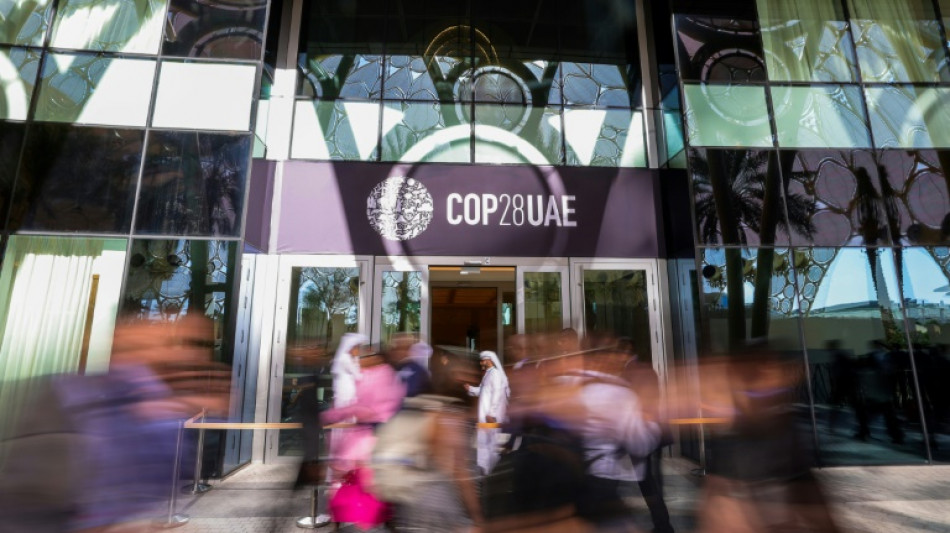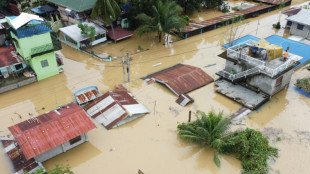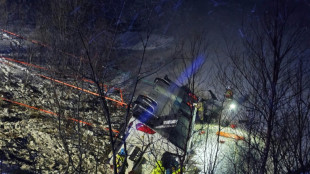
-
 'Dangerous new era': climate change spurs disaster in 2024
'Dangerous new era': climate change spurs disaster in 2024
-
Fritz motivated for Slam success after low-key off-season

-
 Move over Mercedes: Chinese cars grab Mexican market share
Move over Mercedes: Chinese cars grab Mexican market share
-
Zverev aiming to challenge Sinner for top ranking

-
 N. Korean soldier captured in Russia-Ukraine war: Seoul
N. Korean soldier captured in Russia-Ukraine war: Seoul
-
Inspired Tsitsipas looking to 'refresh, regroup' in Australia

-
 Seahawks edge Bears to boost NFL playoff hopes
Seahawks edge Bears to boost NFL playoff hopes
-
Thunder NBA win streak at nine as Shai ties career high with 45

-
 India announces state funeral for ex-PM Manmohan Singh
India announces state funeral for ex-PM Manmohan Singh
-
Japan govt approves record budget for ageing population, defence

-
 Japanese shares gain on weaker yen after Christmas break
Japanese shares gain on weaker yen after Christmas break
-
South Korea's acting president faces impeachment vote

-
 Fleeing Myanmar, Rohingya refugees recall horror of war
Fleeing Myanmar, Rohingya refugees recall horror of war
-
Smith century puts Australia in control of 4th Test against India

-
 Israeli strikes hit Yemen as Netanyahu fires warning
Israeli strikes hit Yemen as Netanyahu fires warning
-
Peru ex-official denies running Congress prostitution ring

-
 Australia's Smith reaches 34th Test century
Australia's Smith reaches 34th Test century
-
NHL Red Wings fire Lalonde and name McLellan as head coach

-
 Injured Halep withdraws from Australian Open
Injured Halep withdraws from Australian Open
-
Liverpool power seven points clear, Man Utd crash at Wolves

-
 Leaders Liverpool survive Leicester scare to go seven points clear
Leaders Liverpool survive Leicester scare to go seven points clear
-
Membership of UK's anti-immigration Reform party surpasses Conservatives

-
 Two dead in treacherous Sydney-Hobart yacht race
Two dead in treacherous Sydney-Hobart yacht race
-
Amorim warns of 'long journey' ahead for miserable Man Utd

-
 Three dead, four injured in Norway bus accident
Three dead, four injured in Norway bus accident
-
Man Utd fall to Wolves as Fernandes sees red

-
 Fernandes sent off as Man Utd crash at Wolves, troubled Man City held by Everton
Fernandes sent off as Man Utd crash at Wolves, troubled Man City held by Everton
-
'Logical' that fatigued Spurs are faltering - Postecoglou

-
 Manmohan Singh: technocrat who became India's accidental PM
Manmohan Singh: technocrat who became India's accidental PM
-
India's former PM Manmohan Singh dies aged 92

-
 Acid risk contained in deadly Brazil bridge collapse
Acid risk contained in deadly Brazil bridge collapse
-
Chelsea stunned by Fulham in blow to Premier League title hopes

-
 Troubled Man City held by lowly Everton, Chelsea title bid rocked
Troubled Man City held by lowly Everton, Chelsea title bid rocked
-
Paterson, Bosch give South Africa edge over Pakistan in first Test

-
 Oil leak in Peru tourist zone triggers 'environmental emergency'
Oil leak in Peru tourist zone triggers 'environmental emergency'
-
Mozambique post-election violence kills 125 in three days: NGO

-
 Finns probing ship from Russia for 'sabotage' of cables
Finns probing ship from Russia for 'sabotage' of cables
-
Williams hits unbeaten 145 as Zimbabwe make Afghanistan toil

-
 Bowlers bring Pakistan back into first Test in South Africa
Bowlers bring Pakistan back into first Test in South Africa
-
Banbridge foils French to land King George VI Chase for Ireland

-
 Man City pay penalty for Haaland miss in Everton draw
Man City pay penalty for Haaland miss in Everton draw
-
Paterson takes five wickets as Pakistan bowled out for 211

-
 Kremlin cautions on 'hypotheses' over plane crash
Kremlin cautions on 'hypotheses' over plane crash
-
Pakistan military convicts 60 more civilians of pro-Khan unrest

-
 Turkey lowers interest rate to 47.5 percent
Turkey lowers interest rate to 47.5 percent
-
Syria authorities launch operation in Assad stronghold

-
 Record number of migrants lost at sea bound for Spain in 2024: NGO
Record number of migrants lost at sea bound for Spain in 2024: NGO
-
Kohli called out over shoulder bump with Konstas during fourth Test

-
 Rural communities urged to flee east Australia bushfire
Rural communities urged to flee east Australia bushfire
-
Sri Lanka train memorial honours tsunami tragedy


Controversial carbon credits flood COP28, yet still no rules
The COP28 climate talks have been flooded with announcements hyping controversial carbon credits before rules for them have been hammered out, with environmental groups fearing "greenwashing" on a massive scale.
The concept behind the credits has taken a major hit recently as scientific research has repeatedly shown claims of reduced emissions under the schemes are often hugely overestimated -- or simply non-existent.
Carbon credits allow corporations -- or countries under certain conditions -- to offset their greenhouse gas emissions.
One credit equals the reduction or removal of one tonne of CO2 from the atmosphere, often in developing countries by projects focusing on things like fighting deforestation.
Scientists stress that any offsetting should not be used as a passport to continue polluting, with emissions needing to fall by almost half this decade to meet global warming goals.
US climate envoy John Kerry declared on Sunday that his country's Energy Transition Accelerator for developing nations -- one of a number being touted -- as a "bold new idea" .
However environmental groups quickly expressed scepticism, pointing to the past failures of similar schemes.
The initiative -- a partnership between the US government, the Rockefeller Foundation and billionaire Jeff Bezos's Earth Fund -- aims to shift developing countries from dirty to clean fuel.
Under the scheme, companies -- and potentially countries -- will be able to buy credits for carbon emissions from projects that do things like boost renewable energy, build electrical transmission lines or "retire" coal plants.
- 'Smoke and mirrors' -
Amazon, Bank of America, Mastercard, McDonald's, Morgan Stanley, PepsiCo and Walmart are some of the US corporate giants lining up to pilot projects in Chile, the Dominican Republic and Nigeria.
Kerry said the initiative could generate tens of billions of dollars, insisting the credits will be "high integrity" and "not the kind of carbon crediting that you read about in some headlines."
He was referring to a series of investigations in recent months that have raised doubts about the effectiveness and integrity of the vast majority of carbon credits already in circulation.
Erika Lennon, a lawyer for the Center for International Environmental Law, said the announcement was "merely smoke and mirrors distracting from the US's paltry contribution to climate finance".
Washington said it was working with the World Bank to ensure the quality of the credits.
Separately on Friday, the World Bank said it had plans to help 15 developing countries in Africa, Southeast Asia and Latin America to earn money from carbon credits by 2028 for forest protection.
Such projects have previously been shown to be the least reliable for reducing emissions, but the World Bank insisted its scheme would be of "high integrity".
AFP has also identified hundreds of events dedicated to carbon credits at COP28, many led by companies seeking a way to compensate -- at least on paper -- for their carbon footprint.
- Vagueness -
Many different players have rushed to set up their own carbon credit rules, slowing down negotiations for a common regulatory framework, according to environmental groups.
This absence of common rules has given companies free rein to engage in widely-criticised offsetting as part of a voluntary carbon credit market.
At COP28, negotiators have been tasked with looking into applying Article Six of the 2015 Paris Agreement.
It allows countries to cooperate on hitting their emissions-reduction targets -- including by swapping carbon credits.
It also envisages a reform of the global carbon credit market that has been dragging on for years.
The Climate Action Network, which brings together hundreds of environmental groups, was scathing about the lack of ambition.
"Just like last year, we feel the draft (agreement) is more likely to remove ambition from climate action than carbon dioxide from the atmosphere," it added.
The network also criticised the vagueness of planned rules for a future UN supervisory body overseeing a global carbon market, which it said could leave the "door too wide open for risky practices" and to protect the rights of the communities involved.
These contentious rules could still be pushed through by countries impatient to start offsetting their emissions, led by wealthy and oil-producing nations -- and possibly developing countries keen to reap vast sums from the market.
On Friday, around 10 countries including the United States, France and the UAE -- as well as Colombia, Kenya and Senegal -- called for carbon markets to be "complementary" to efforts to reduce emissions.
They said that there must be "transparency" and "high-integrity standards" for these markets to reach their potential.
R.Veloso--PC



